By Suzanne Leigh

Bill E. worked as a Marine reservist until voices drove him to a psychotic break. He credits Citywide social workers and other staff with helping him establish a new life. [Photo: Noah Berger]
Just blocks from the streets where he used to live with his 50-pound backpack with tent, camp stove and guitar, is Bill E.’s studio apartment. Here, hand towels are folded tidily over a bathroom railing with cleaning products lined up neatly. In his kitchenette, a coffee maker and toaster jostle for space on a modest food prep area next to a gleaming sink and two-burner stove.
Missing is the bric-a-brac of sentimental value that most of us accumulate: family photos, vacation mementoes, cards from loved ones, artwork. Its absence is evidence, perhaps, that Bill has made a break from a tumultuous past marked by uncontrolled schizophrenia, drugs and alcohol, a fleeting marriage and 10 years of living on the San Francisco streets hand to mouth, while he struggled with hepatitis C and crippling neuropathy.
“I’m grateful to a lot of people, San Francisco has been very kind to me,” says Bill, 58, who grew up on his family’s farm in Stockton, California, and worked as a Marine reservist until voices drove him to a psychotic break leading to his first hospitalization.
Mostly, Bill is grateful for Citywide Case Management, a 43-year-old program located in the city’s Mission district, serving clients with serious mental illness. The majority are unhoused and approximately 75% have substance use disorder. Citywide may be the only program in San Francisco that recognizes that transforming the lives of the city’s most vulnerable residents requires more than a door key and a doctor’s appointment — it requires a tightly integrated team to take on the facets of their daily life, like ensuring bills get paid, food is available, therapy is accessible and medications are managed.
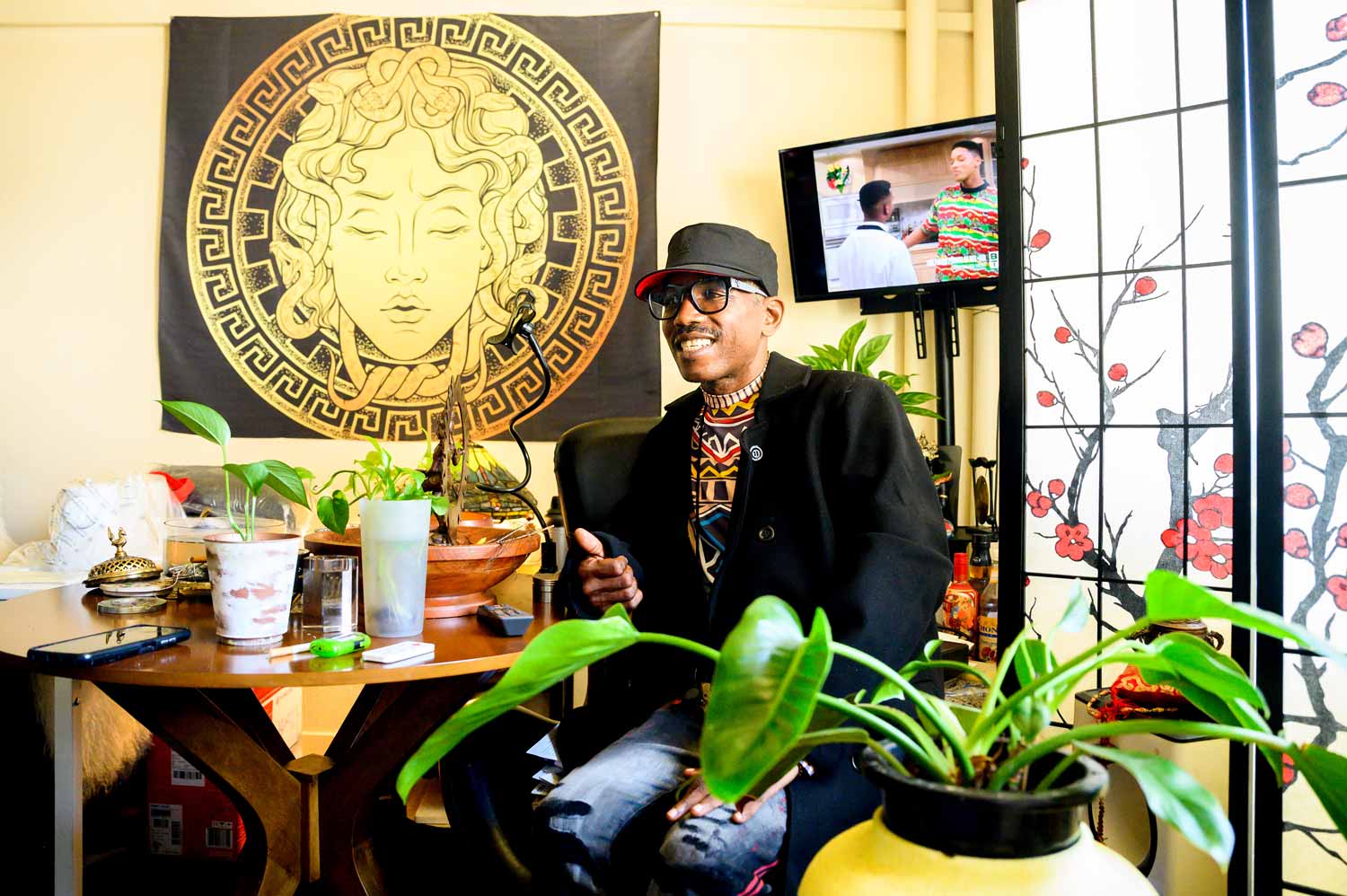
Mental illness led to bursts of erratic behavior resulting in jail time for Citywide client James B. Today, he thrives in his permanent supportive housing unit, where he likes to cook and sew. “I’m grateful to have food, peace, the desire to have adventure.” [Photo: Noah Berger] |
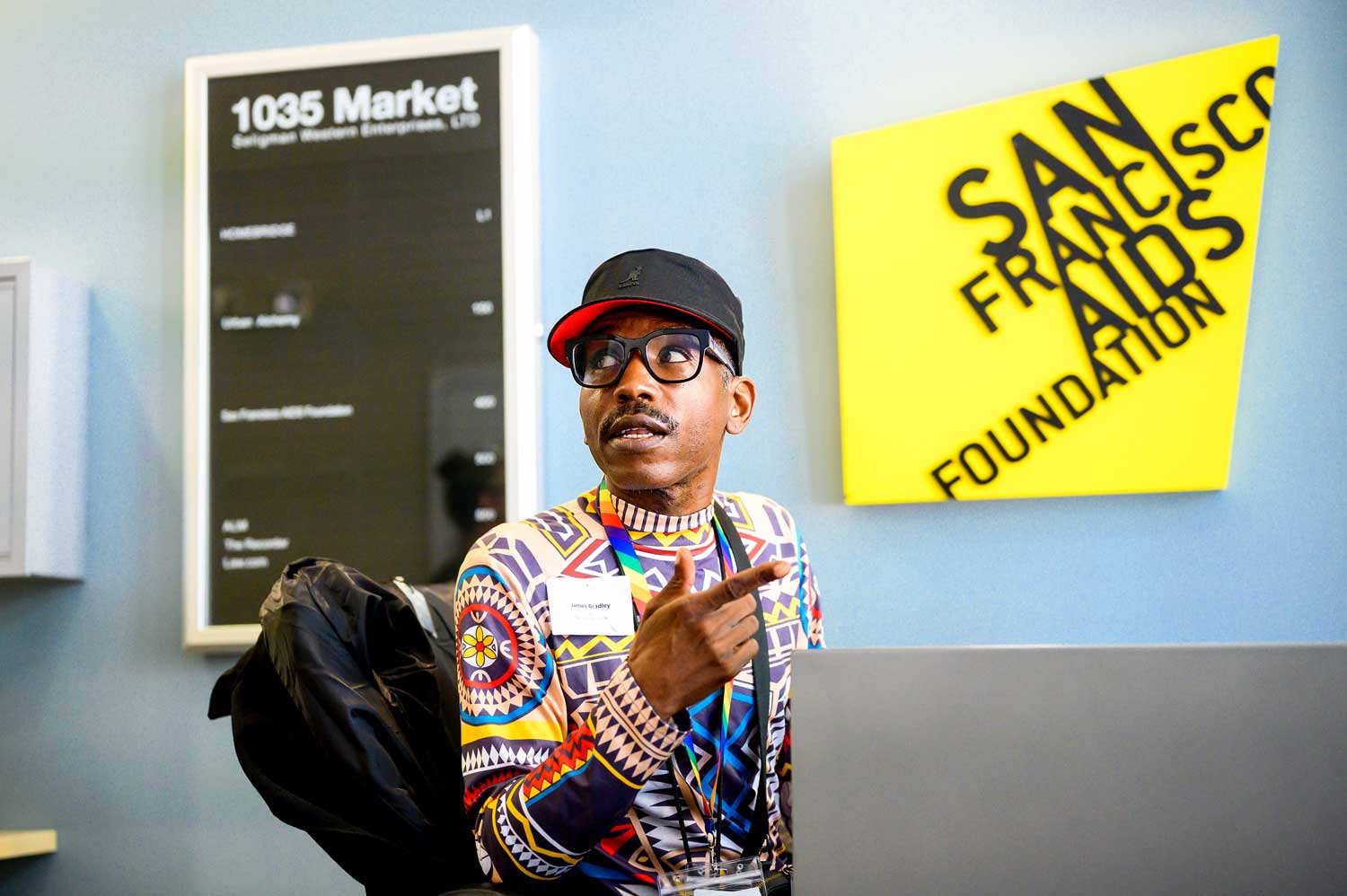
James gives back by volunteering as a peer ambassador at the San Francisco Aids Foundation. [Photo: Noah Berger] |
Partnership cares for 2,000 of San Francisco's most vulnerable residents
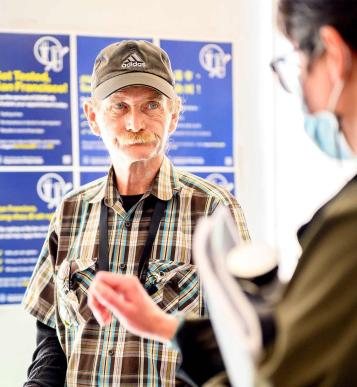
Citywide Case Management client Bill speaks with a social worker. [Photo: Noah Berger]
Bill credits his social worker, Robyn Miles, LMFT, one of 188 full-time Citywide employees, with “using her magic to turn my life around,” and refers to his care worker who visits his apartment on weekdays as his best friend. His days are spent tinkering with his computer equipment, preparing meals and chatting with his care worker. “I’m back and I’m happy because I know I’m not alone anymore, and I’m here in my favorite city,” he says.
Citywide is a testament to the 150-year partnership between Zuckerberg San Francisco General Hospital and Trauma Center (ZSFG) and UC San Francisco.
The program cares for approximately 2,000 clients a year and is staffed by UCSF employees, who include peer counselors and employment specialists, and overseen by the UCSF Department of Psychiatry and Behavioral Sciences. It partners with the State of California, the San Francisco Department of Public Health, and other city departments in programs that they fund.
Citywide is the city’s largest provider of intensive case management, in which multidisciplinary teams map out a plan for each client tailored to their health and housing needs, their life skills, and work and education background. Citywide’s 17 mobile teams see clients on the streets and in shelters and navigation centers — with additional teams located at housing sites, where they provide clinical support to residents.
It also offers one of the city’s few day programs for clients to have coffee or lunch, play bingo or participate in a drop-in group. For many clients, the program is their only source of socialization. “Many clients lack family support and often a Citywide provider will be the only emergency contact on a client’s health record,” says Citywide director and psychiatrist Fumi Mitsuishi, MD.
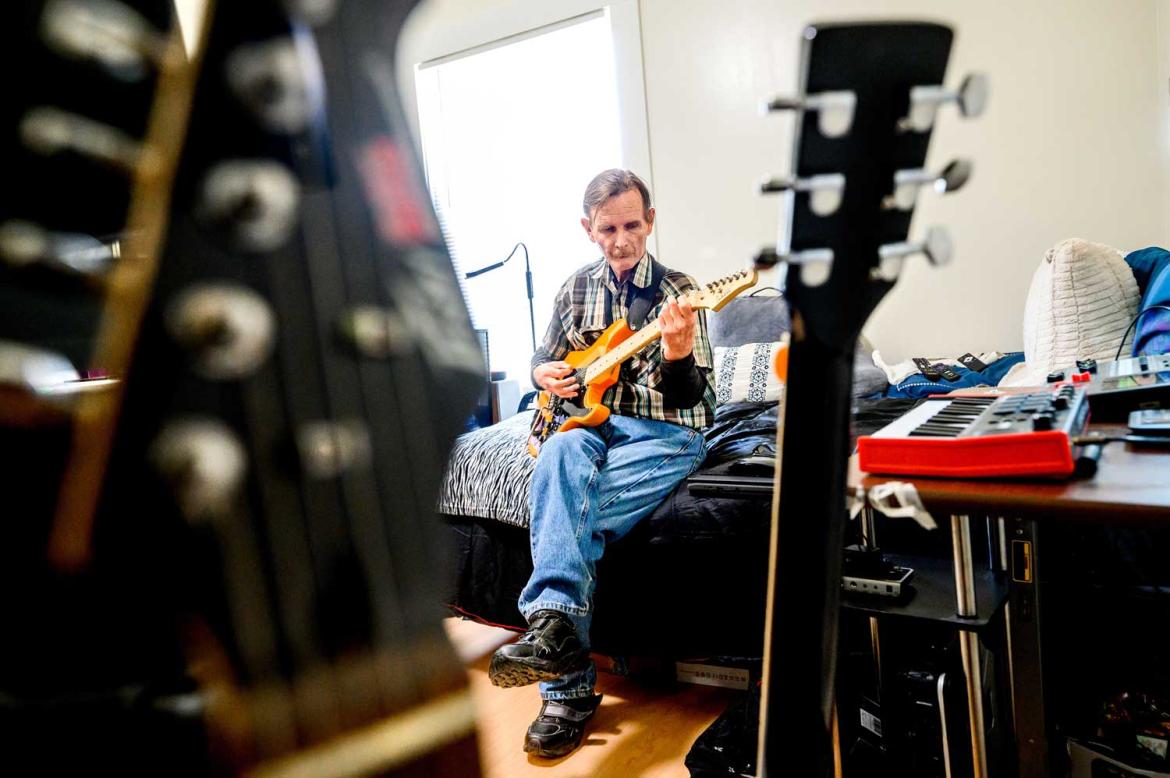
After years of homelessness, Citywide assisted Bill with finding permanent supportive housing, close to the streets where he used to sleep. “I’m back and I’m happy because I know I’m not alone anymore.” [Photo: Noah Berger]
Walk with clients all the way
When Bill first appeared on Citywide’s radar, he was rotating between the streets and ZSFG with frequent admissions for psychosis. He was in an advanced stage of mental illness with entrenched substance use disorders. “Most of our clients have schizophrenia; they don’t trust the system because they haven’t had their needs met before,” says Alison Livingston, MFT, director of Citywide’s stabilization program. “They require intensive engagement and outreach. We try to figure out what they want — a sweatshirt, food, shoes — in order to engage them. Sometimes you have to meet all their needs on the street, which includes primary care and psychotropic medications.”
Citywide walks with clients all the way — sometimes literally. Staffers accompanied Bill to medical appointments until he stabilized. They referred him to a residential treatment center for patients with substance use disorder and mental illness and helped him apply for permanent supportive housing. They ensure his rent gets paid and continue to provide medication management and dialectical behavior therapy in which he learns how to cope with intense emotions, addictive behaviors and relationships struggles.
Citywide also cheered him on during his journey to sobriety – he has not touched drugs or alcohol for three-and-a-half years, he says — and celebrated his move to permanent supportive housing.
Working with the most severely ill clients is labor intensive and costly, says Mitsuishi, but data suggests that programs like Citywide may help reduce recidivism and possibly hospital admissions — both of which serve as default housing for those with serious mental illness, and both of which are ultimately costlier than the services that programs like Citywide provide to help them back to their feet.
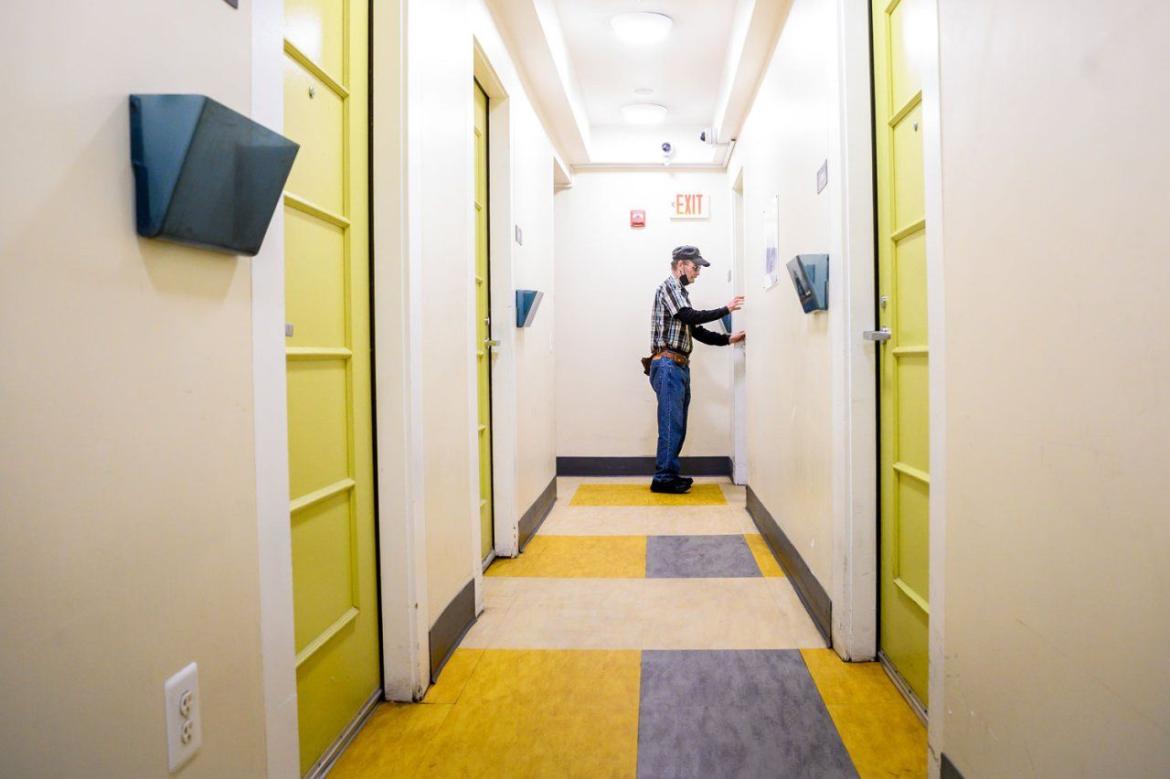
Citywide staffers referred Bill to a residential treatment center for patients with substance use disorder and mental illness and helped him apply for permanent supportive housing. They ensure his rent gets paid and continue to provide medication management and dialectical behavior therapy. [Photo: Noah Berger]
About UCSF Psychiatry and Behavioral Sciences
The UCSF Department of Psychiatry and Behavioral Sciences and the Langley Porter Psychiatric Institute are among the nation's foremost resources in the fields of child, adolescent, adult, and geriatric mental health. Together they constitute one of the largest departments in the UCSF School of Medicine and the UCSF Weill Institute for Neurosciences, with a mission focused on research (basic, translational, clinical), teaching, patient care, and public service.
UCSF Psychiatry and Behavioral Sciences conducts its clinical, educational, and research efforts at a variety of locations in Northern California, including the UCSF Nancy Friend Pritzker Psychiatry Building; UCSF Langley Porter Psychiatric Hospital; UCSF Medical Centers at Parnassus Heights, Mission Bay, and Mount Zion; UCSF Benioff Children’s Hospitals in San Francisco and Oakland; Zuckerberg San Francisco General Hospital and Trauma Center; the San Francisco VA Health Care System; UCSF Fresno; and numerous community-based sites around the San Francisco Bay Area.
About the UCSF Weill Institute for Neurosciences
The UCSF Weill Institute for Neurosciences, established by the extraordinary generosity of Joan and Sanford I. "Sandy" Weill, brings together world-class researchers with top-ranked physicians to solve some of the most complex challenges in the human brain.
The UCSF Weill Institute leverages UCSF’s unrivaled bench-to-bedside excellence in the neurosciences. It unites three UCSF departments—Psychiatry and Behavioral Sciences, Neurology, and Neurological Surgery—that are highly esteemed for both patient care and research, as well as the Neuroscience Graduate Program, a cross-disciplinary alliance of nearly 100 UCSF faculty members from 15 basic-science departments, as well as the UCSF Institute for Neurodegenerative Diseases, a multidisciplinary research center focused on finding effective treatments for Alzheimer’s disease, frontotemporal dementia, Parkinson’s disease, and other neurodegenerative disorders.
About UCSF
The University of California, San Francisco (UCSF) is exclusively focused on the health sciences and is dedicated to promoting health worldwide through advanced biomedical research, graduate-level education in the life sciences and health professions, and excellence in patient care. UCSF Health, which serves as UCSF’s primary academic medical center, includes top-ranked specialty hospitals and other clinical programs, and has affiliations throughout the Bay Area.





